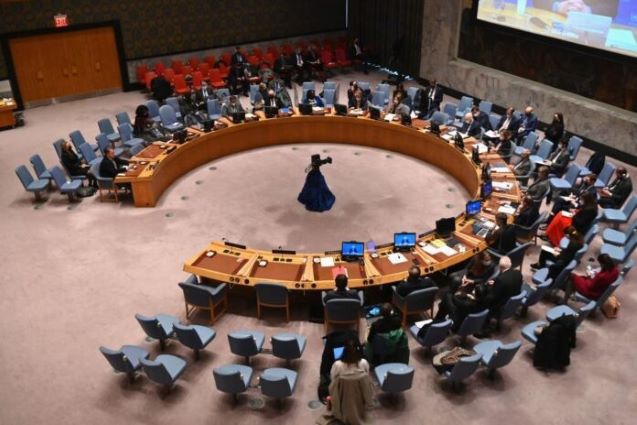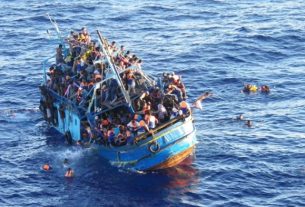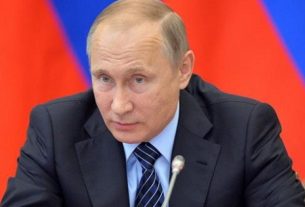The World Health Organisation warned on Sunday that the Nasser Hospital in Gaza is “not functional anymore”.
Israeli strikes across Gaza killed at least 18 people overnight and into Sunday, according to medics and witnesses, as the United States said it would veto another draft UN ceasefire resolution.
An airstrike in Rafah overnight killed six people, including a woman and three children, and another strike killed five men in Khan Younis, the main target of the offensive over the past two months.
In Gaza City, which was isolated, largely evacuated and suffered widespread destruction in the initial weeks of the war, an airstrike flattened a family home, killing seven people, including three women, according to Sayed al-Afifi, a relative of the deceased.
Israeli Prime Minister Benjamin Netanyahu remained defiant to international pressure over a ground operation in Rafah – where 1.4 million Palestinians, more than half the enclave’s population, are sheltering – and to calls for a two-state solution to the conflict.
Such calls were reiterated by the French and Egyptian leaders on Sunday who, according to a readout of their call from the Elysée “expressed their firm opposition to an Israeli offensive at Rafah, which would lead to a humanitarian catastrophe on a new scale, as well as any forced displacement of populations into Egyptian territory, which would constitute a violation of international humanitarian law and pose a further risk of regional escalation”.
“They also stressed the need to work towards a way out of the crisis, and the decisive and irreversible relaunch of the political process, with a view to the effective implementation of the two-state solution,” the readout also says.
Negotiations ‘not progressing as expected’
But Netanyahu’s Cabinet adopted a declaration Sunday saying Israel “categorically rejects international edicts on a permanent arrangement with the Palestinians” and opposes any unilateral recognition of a Palestinian state, which it said would “grant a major prize to terror” after the Oct. 7 attack that triggered the war.
Netanyahu has vowed to continue the offensive until “total victory” over Hamas and to expand it to Gaza’s southernmost town of Rafah.
The US, Israel’s top ally, which hopes to broker a ceasefire agreement and hostage release between Israel and Hamas, and envisions a wider resolution of the Israeli-Palestinian conflict, meanwhile said it would veto a draft UN ceasefire resolution circulated by Algeria.
The Arab representative on the UN Security Council’s resolution calls for an immediate humanitarian ceasefire, unhindered humanitarian access, as well as rejecting the forced displacement of Palestinian civilians.
US Ambassador Linda Thomas-Greenfield said in a statement late Saturday that the draft resolution runs counter to Washington’s own efforts to end the fighting and “will not be adopted.”
“It is critical that other parties give this process the best odds of succeeding, rather than push measures that put it — and the opportunity for an enduring resolution of hostilities — in jeopardy,” she said.
The US, Qatar and Egypt have spent weeks trying to broker a ceasefire and hostage release, but there’s a wide gap between Israel and Hamas’ demands and Qatar said Saturday that the talks “have not been progressing as expected.”
Hamas has said it will not release all of the remaining hostages without Israel ending the war and withdrawing from Gaza. It is also demanding the release of hundreds of Palestinians imprisoned by Israel, including top militants.
Netanyahu has publicly rejected both demands and any scenario in which Hamas would be able to rebuild its military and governing capabilities. He said he sent a delegation to ceasefire talks in Cairo last week at Biden’s request but doesn’t see the point in sending them again.
WHO team prevented from entering Nasser Hospital
Meanwhile, the head of the World Health Organization (WHO) said that Nasser Hospital, the main medical centre serving southern Gaza, “is not functional anymore” after Israeli forces raided the facility in the southern city of Khan Younis last week.
Dr. Tedros Adhanom Ghebreyesus, the head of the UN health agency, said a WHO team was not allowed to enter Nasser Hospital on Friday or Saturday “to assess the conditions of the patients and critical medical needs, despite reaching the hospital compound to deliver fuel alongside partners.”
In a post on X, formerly Twitter, he said there are still about 200 patients in the hospital, including 20 who need urgent referrals to other hospitals.
Israel says it has arrested over 100 suspected militants, including 20 who it says participated in Hamas’ Oct. 7 attack on Israel, without providing evidence. The military says it is looking for the remains of hostages inside the facility and does not target doctors or patients.
The Gaza Health Ministry said 70 medical personnel were among those arrested, as well as patients in hospital beds who were taken away in trucks. Ashraf al-Qidra, a spokesperson for the ministry, said soldiers beat detainees and stripped them of their clothes. There was no immediate comment from the military on those allegations.
The war erupted after Hamas burst through Israel’s defences and attacked communities across southern Israel, killing some 1,200 people, mostly civilians, and taking around 250 hostage. Militants still hold around 130 hostages, a fourth of whom are believed to be dead, after most of the others were released during a weeklong ceasefire in November.
At least 28,985 Palestinians, mostly women and children, have been killed since the beginning of the war, according to Gaza’s Health Ministry, which does not distinguish between civilians and combatants in its records. The toll includes 127 bodies brought to hospitals in the past 24 hours, it said Sunday. Around 80% of Gaza’s population have been driven from their homes and a quarter face starvation.__Courtesy Euro News





